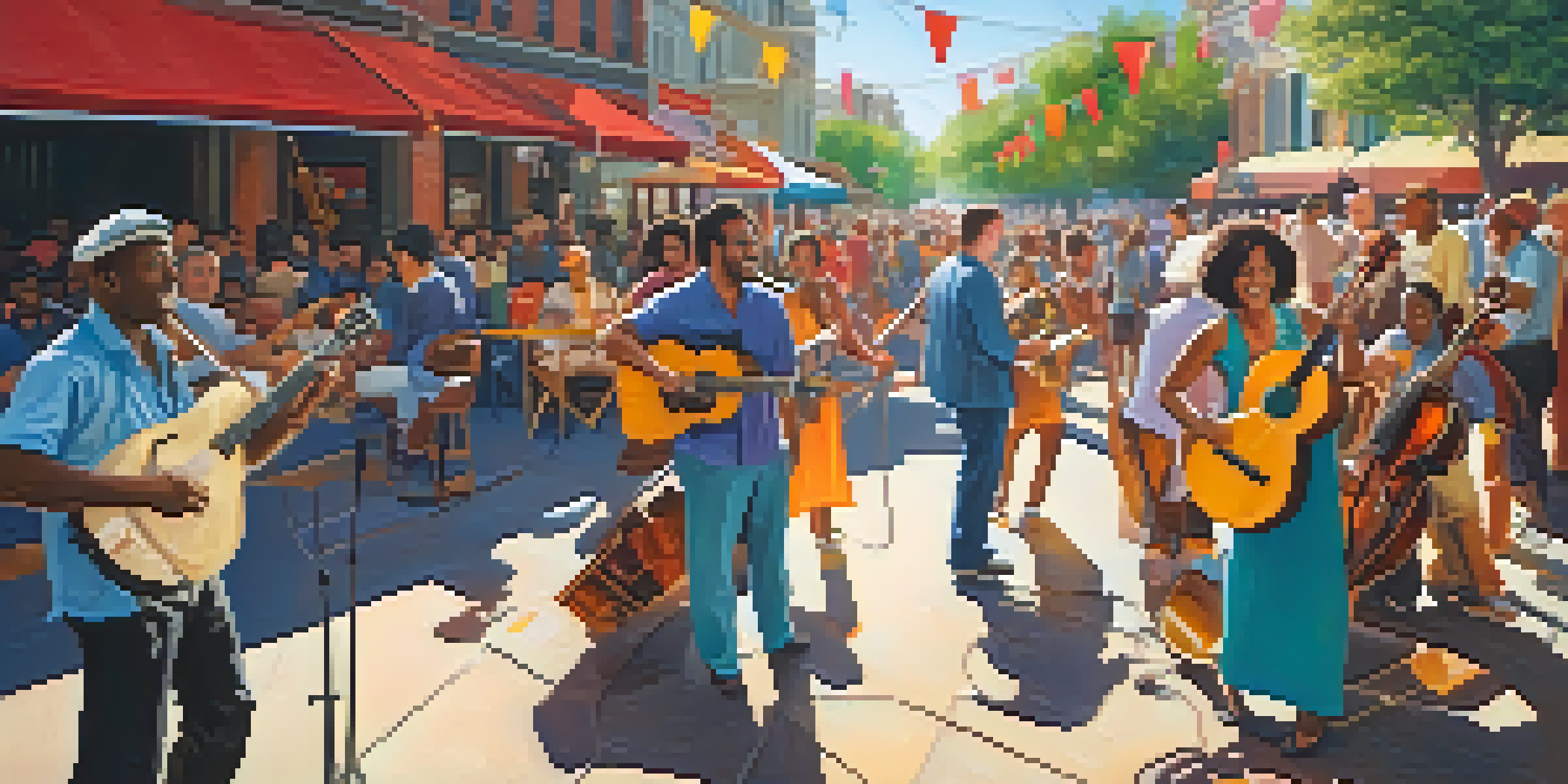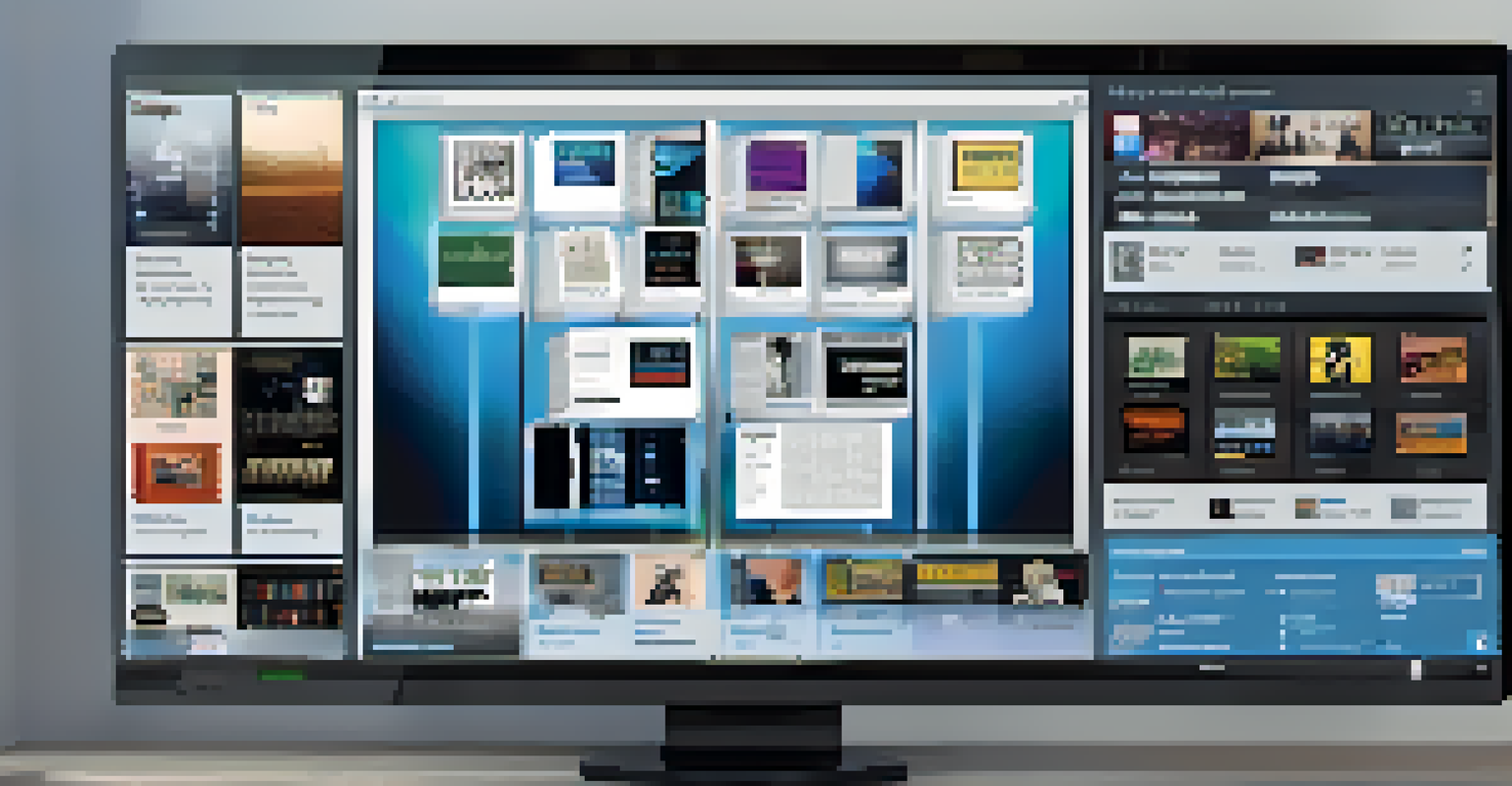The Impact of Music Licensing on the Industry

Understanding Music Licensing: A Primer for Everyone
Music licensing refers to the legal permissions required to use music in various contexts, from film to advertising. Without these licenses, creators risk facing legal actions, which can be costly and damaging. Understanding this concept is essential for artists, producers, and businesses alike, as it lays the groundwork for how music can be utilized legally.
Without music, life would be a mistake.
Different types of licenses exist, such as synchronization licenses for using music in audiovisual projects and mechanical licenses for reproducing music. Each type serves a specific purpose and involves different rights holders, including songwriters, performers, and record labels. By grasping these distinctions, stakeholders can navigate the complexities of music rights more effectively.
Ultimately, music licensing isn't just about legality; it's about respect for the creators' work. By ensuring that artists are compensated fairly for their contributions, the industry fosters a healthier ecosystem where creativity can thrive.
The Role of Music Licensing in the Creative Process
For many creators, music is a key ingredient in storytelling, whether it's in film, television, or marketing. Licensing allows these creators to incorporate existing songs, enhancing emotional engagement and viewer experience. However, obtaining the right licenses can sometimes feel like navigating a maze, often requiring time and resources that might be scarce.

Moreover, the availability of music libraries and royalty-free options has changed the landscape, offering alternatives for creators on tighter budgets. These libraries can provide a vast array of tracks, enabling filmmakers and advertisers to find the perfect sound without the hassle of negotiating licenses. However, the trade-off is often a lack of exclusivity and uniqueness in the music used.
Music Licensing is Essential for Creators
Understanding music licensing is crucial for artists and businesses to legally use music and protect their rights.
In summary, music licensing plays a vital role in the creative process, influencing how stories are told and experienced. It strikes a balance between creativity and legality, ensuring that artists receive due credit while allowing creators to enhance their projects with music.
How Music Licensing Affects Artists and Their Revenue
For artists, music licensing can be a significant source of income. When songs are licensed for commercials, films, or video games, artists can earn royalties that contribute to their overall revenue. This aspect of licensing not only provides financial support but also increases the exposure of their work to new audiences.
Music is the shorthand of emotion.
However, navigating the licensing landscape can be challenging for independent artists who might not have the resources or knowledge to secure deals. Many rely on publishing companies or licensing agencies to help manage their rights and negotiate terms. This reliance can sometimes lead to artists receiving a smaller percentage of the earnings, raising questions about fairness in the industry.
Ultimately, while music licensing can be a boon for artists, it also highlights the disparities in the industry. Ensuring that all artists, regardless of their status, understand and can access licensing opportunities is essential for a more equitable music ecosystem.
The Impact of Digital Platforms on Music Licensing
The rise of digital platforms has revolutionized how music is consumed and licensed. Streaming services like Spotify and Apple Music have created a demand for music that requires new licensing agreements, often leading to complex negotiations. This shift has prompted many artists to rethink how they approach music distribution and licensing.
Moreover, platforms like YouTube have introduced Content ID, a system that automatically identifies copyrighted music and manages licensing for creators. While this can help protect artists' rights, it can also lead to frustrations for content creators who may find their videos demonetized due to unintentional copyright issues. This highlights the delicate balance between protecting artists and supporting creators.
Digital Platforms Change Licensing Dynamics
The rise of streaming and social media platforms complicates music licensing, requiring new agreements and adjustments for both artists and creators.
In essence, digital platforms have added layers of complexity to the music licensing landscape. As technology continues to evolve, so too will the methods and practices surrounding music licensing, making it crucial for all stakeholders to stay informed.
The Global Perspective on Music Licensing
Music licensing isn't confined to one country; it's a global issue that varies significantly from region to region. Different countries have distinct laws and practices surrounding music rights, which can complicate international projects. For artists and producers looking to work across borders, understanding these differences is crucial to avoid legal pitfalls.
For instance, the European Union has made strides toward harmonizing copyright laws, but challenges remain, particularly with how royalties are collected and distributed. This can lead to disparities in how artists are compensated for their work internationally. Navigating these complex waters requires not only legal knowledge but also a cultural sensitivity to the varied music landscapes around the world.
Ultimately, a global perspective on music licensing underscores the need for collaboration and communication among artists, producers, and licensing bodies. By working together, the industry can create a more cohesive and fair environment for music creators everywhere.
Challenges in Music Licensing: Case Studies and Anecdotes
Numerous artists have faced challenges with music licensing that highlight the complexities of the system. Take the case of a small indie band whose song became viral on social media. While this exposure was thrilling, the band soon realized they had not secured the proper licenses for their song's use, leading to a potential legal nightmare. This example illustrates the importance of understanding licensing before sharing music online.
Another common challenge arises in the film industry, where directors often have a specific vision for their soundtrack but face hurdles in securing licenses for their desired songs. This can lead to compromises, forcing creative teams to opt for less impactful music. Such situations can stifle artistic expression and highlight the need for a more streamlined licensing process.
Global Variations in Music Licensing
Music licensing varies significantly across countries, making it essential for international projects to navigate diverse laws and practices.
These anecdotes serve as reminders that while music licensing is essential, it can also pose significant challenges for creators. By learning from these experiences, artists and producers can better navigate the complexities of music rights, leading to more successful collaborations.
The Future of Music Licensing: Trends to Watch
As the music industry continues to evolve, so too does the landscape of music licensing. One trend to watch is the rise of blockchain technology, which promises to streamline the licensing process by providing transparent and immutable records of ownership. This could lead to more efficient royalty distribution, ensuring that artists are compensated fairly and promptly.
Additionally, the increasing popularity of user-generated content on platforms like TikTok is changing how music is licensed. As more creators seek to use popular songs in their videos, licensing agreements are becoming more flexible to accommodate this demand. This shift could open new avenues for artists to earn income and reach wider audiences.

Ultimately, the future of music licensing holds exciting possibilities. By embracing new technologies and adapting to changing consumer behaviors, the industry can create a more equitable and efficient system that benefits all stakeholders.